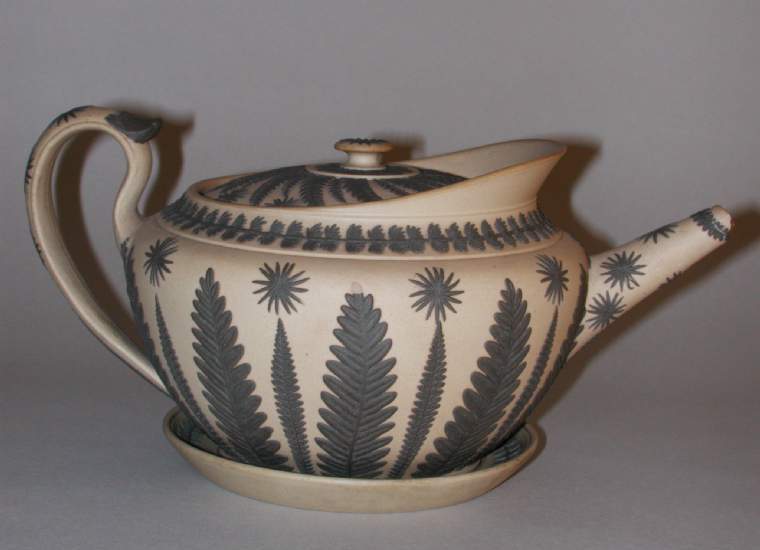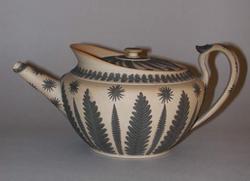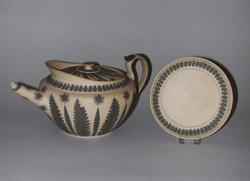Current Location: In storage
Maker(s)
Factory:
Josiah Wedgwood & Sons
Entities
Categories
Description
Caneware with dark grey reliefs, the interior of the pot glazed. The teapot is globular with a flared cape, straight spout and loop handle with a thumbpiece rising above the shoulder. The slightly convex circular cover has a pierced horizontal button knob. The body is decorated with vertical ferns of two alternating shapes, above are stars or seed heads. The shoulder is encircled by a stem with closely spaced paired sprouts. The handle has a fern at the bottom and three stars; the spout has six stars and a fern round the end. The cover (A) is decorated with a central petalled flower surrounded by radiating swirling ferns and stars, and there is a star on the knob.
The circular stand (B) has shallow curved sides and a slightly recessed base. On the inside there is turned indented band below the rim and a raised band round the emplacement for the pot. The sides are decorated with a continuous stem with closely paired leaves or fronds.
Notes
History note: Collection of Swann Hurrell, 30 Thompson’s Lane, Cambridge and from 1891, St Leonard’s (d. 1897); his niece, Miss Emily Beales, ‘Hurrell’, St Leonard’s on Sea
Legal notes
Given by Miss Emily Beales
Acquisition and important dates
Method of acquisition: Given
(1915-06-26)
by
Beales, Emily, Miss
Dating
William IV
Circa
1830
-
1840
Note
Wedgwood was producing teapots in caneware by 1776, but was not yet satisfied with it. A 'New cane' was in production by 1779, but was not mentioned in the 1779 Catalogue. See Edwards, Diana, 'Recent Research in the Wedgwood Archives: Early Developments in Caneware', Ars Ceramica, Number 16 (2000), pp. 36-39. Caneware was first announced in the 1787 Catalogue, in which it was described as 'bamboo or cane-coloured bisque porcelain ... both plain, and enriched with Grecian and Etruscan ornaments.' According to Robin Reilly, Wedgwood, London, 1989, II, p. 482, 'The fern ornaments were in use by 1812, when they are recorded in Bateman's orders (e.g. 18-16278)'. On p. 477 however, in referring to borders, he mentions ''rose' and 'fern leaf' added no later than 1830'. In Wedgwood, The New Illustrated Dictionary, Woodbridge, 1995, p. 159, fern leaf decoration was introduced about 1830. The design is known as 'Darwin Pattern'.
School or Style
Neoclassical
Components of the work
Stand (B)
Diameter 13.8 cm
Height 1.5 cm
Teapot
Height 12.5 cm
Width 25.3 cm
Reliefs
Materials used in production
type of dry-bodied stoneware
Caneware
Inscription or legends present
- Text: WEDGWOOD
- Location: On teapot and stand
- Method of creation: Impressed
- Type: Mark
- Text: S
- Location: On teapot and stand
- Method of creation: Impressed
- Type: Mark
References and bibliographic entries
-
Catalogue of cameos, intaglios, medals, bas-reliefs, busts, and small statutes; with a general account of tablets, vases, escritoires, and other ornamental and useful articles. The whole formed in different kinds of porcelain and terra-cotta, chiefly after the antique and the first models of modern artists. By Josiah Wedgwood FRS, potter to Her Majesty, and to His Royal Highness the Duke of York and Albany. Sold at his rooms in Greek Str., Soho, London, and at his manufactory in Staffordshire.
-
Wedgwood
page(s): pp. 477, 482
-
Wedgwood, The New Illustrated Dictionary
page(s): p. 159
-
Recent Research in the Wedgwood Archives: Early Developments in Caneware
page(s): pp. 36-9
-
Good European Ceramics, Glass and Enamels
page(s): p. 273
Identification numbers
Accession number: C.21 & A & B-1915
Primary reference Number: 12025
Stable URI
Audit data
Created: Saturday 6 August 2011
Updated: Tuesday 30 April 2024
Last processed: Tuesday 13 May 2025
Associated departments & institutions
Owner or interested party:
The Fitzwilliam Museum
Associated department:
Applied Arts






